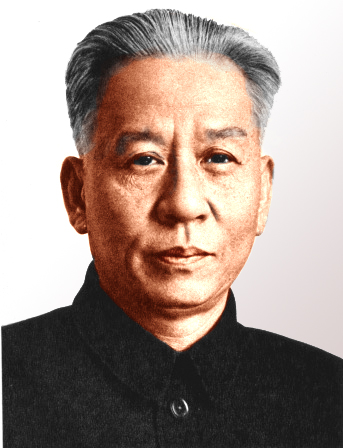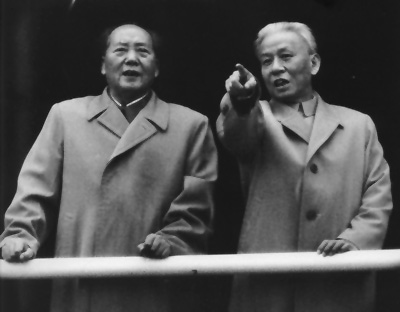<Back to Index>
- 2nd Chairman of the People's Republic of China Liu Shaoqi, 1898
PAGE SPONSOR


Liu Shaoqi (24 November 1898 – 12 November 1969) was a Chinese revolutionary, statesman, and theorist. He was Chairman of the People's Republic of China, China's head of state, from 27 April 1959 to 31 October 1968, during which he implemented policies of economic reconstruction in China. He fell out of favor in the later 1960s during the Cultural Revolution because of his perceived 'right - wing' viewpoints and, it is theorized, because Mao viewed Liu as a threat to his power. He disappeared from public life in 1968 and was labelled China's premier 'Capitalist - roader' and a traitor. He died under harsh treatment in late 1969, but he was posthumously rehabilitated by Deng Xiaoping's government in 1980 and given a state funeral.
Born into a moderately rich peasant family in Huaminglou village, Ningxiang county, Hunan province, Liu attended Ningxiang Zhusheng Middle School (宁 乡 驻省 中学 Nìng-xiāng zhù-shěng zhōng-xué), and was recommended to attend a class in Shanghai preparing for studying in Russia. In 1920, Liu and Ren Bishi joined into a Socialist Youth Corp; and in the next year, Liu was recruited to study at the Comintern's Sun Yat-sen University in Moscow. In 1921 Liu joined the newly formed Chinese Communist Party (CCP). Liu went back to China in 1922, and as secretary of the All - China Labor Syndicate, led several railway workers' strikes in the Yangzi Valley and at Anyuan on the Jiangxi - Hunan border.
In 1925 Liu became a member of the Guangzhou based All - China Federation of Labor Executive Committee. During the next two years Liu led numerous political campaigns and strikes in Hubei and Shanghai. Liu worked with Li Lisan in Shanghai in 1925, organizing Communist activity following the May Thirtieth Incident. After his work in Shanghai Liu traveled to Wuhan. Liu was briefly arrested in Changsha and then returned to Guangzhou to help organize the 16 month long Canton - Hong Kong strike.
In 1927 Liu was elected to the Party's Central Committee, and was appointed to the head of its Labor Department. In
1929 Liu returned to work at the Party headquarters in Shanghai, and
was named Secretary of the Manchurian Party Committee in Fengtian. In
1930 and 1931, Liu attended the Third and Fourth Plenums of the Sixth
Central Committee, and was elected to the Central Executive Committee
(i.e., Politburo) of the Chinese Soviet Republic in 1931 or 1932. Later
in 1932 Liu left Shanghai and traveled to the Jiangxi Soviet.
In 1932 Liu became the Party Secretary of Fujian Province. In 1934 Liu accompanied the Long March at least as far as the crucial Zunyi Conference, but was then sent to the so-called "White Areas" (areas controlled by the Kuomintang) to reorganize underground activities in northern China, centered around Beijing and Tianjin. In 1936 Liu became Party Secretary in North China, leading the anti - Japanese movements in that area with the assistance of Peng Zhen, An Ziwen, Bo Yibo, Ke Qingshi, Liu Lantao, and Yao Yilin. In 1939 Liu ran the Central Plains Bureau; and, in 1941, the Central China Bureau. Some Japanese sources have alleged that the activities of Liu's organization sparked the Marco Polo Bridge Incident in July 1937, which gave Japan the excuse to formally launch the Second Sino - Japanese War.
In 1937 Liu traveled to the Communist base at Yanan; and, in 1941, Liu became a political commissar of the New Fourth Army. In 1945 Liu was elected as one of five CCP Secretaries at the Seventh National Party Congress. After the Seventh National Party Congress Liu became the supreme leader of all Communist forces in Manchuria and northern China, a stature frequently overlooked by historians.
From 1956 to Liu's downfall in 1966, Liu ranked as the First Vice Chairman of the Communist Party of China. In 1949, Liu became the Vice Chairman of the Central People's Government. Later Liu became the First Vice Chairman of the National People's Congress, and held that position from 1954 – 59. Liu succeeded Mao as Chairman of the People's Republic of China in 1959, and was publicly acknowledged as Mao's chosen successor in 1961.
Liu's work focused on party organizational and theoretical affairs. Liu was an orthodox Soviet style Communist, and favored state planning and the development of heavy industry. Liu elaborated upon his political and economic beliefs in his writings. His best known works include How to be a Good Communist (1939), On the Party (1945), and Internationalism and Nationalism (1952).
In May 1958 Liu became the first senior CCP politician to openly denounce the Great Leap Forward, at the Second Session of the Eighth CCP National Congress. At this Congress Liu stood together with Deng Xiaoping and Peng Zhen against those who supported Mao's policies, led by Chen Yun and Zhou Enlai. Liu voiced further indications of concern in the August 1959 Lushan Plenum.
When Mao's Great Leap Forward became politically and popularly disastrous, Liu gained influence within the CCP. In order to correct the mistakes of the Great Leap Forward Liu and Deng led economic reforms, which bolstered their prestige among the party apparatus and the national populace. The economic policies of Deng and Liu were notable for being more liberal than Mao's radical ideas.
By 1962 Liu's opposition to Mao's policies had led Mao to distrust Liu. After Mao succeeded in restoring his prestige during the 1960s, Liu's eventual downfall became "inevitable". Liu's position as the second most powerful leader of the CCP contributed to Mao's rivalry with Liu at least as much as Liu's political beliefs or factional allegiances in the 1960s, indicating that Liu's later persecution was the result of a power struggle that went beyond the goals and well being of either China or the Party.
By 1966, there were few senior leaders in China that questioned the need for a widespread reform to combat the growing problems of corruption and bureaucratization within the Party and the government. With the goal of reforming the government to be more efficient and true to the Communist ideal, Liu himself chaired the enlarged Politburo meeting that officially began the Cultural Revolution. However, Liu and his political allies quickly lost control of the Cultural Revolution soon after it was called, as Mao used the movement to monopolize political power and to destroy his perceived enemies.
Whatever its other causes, the Cultural Revolution, declared in 1966, was overtly pro - Maoist, and gave Mao the power and influence to purge the Party of his political enemies at the highest levels of government. Along with closing China's schools and universities, and Mao's exhortations to young Chinese to randomly destroy old buildings, temples, and art, and to attack their teachers, school administrators, party leaders, and parents, the Cultural Revolution also increased Mao's prestige so much that entire villages adopted the practice of offering prayers to Mao before every meal. In both national politics and Chinese popular culture, Mao established himself as a demigod accountable to no one, purging any that he suspected of opposing him and directing the masses and Red Guards "to destroy virtually all state and party institutions". After the Cultural Revolution was announced, most of the most senior members of the CPP who had voiced any hesitation in following Mao's direction, including Liu Shaoqi and Deng Xiaoping, were removed from their posts almost immediately; and, with their families, subjected to mass criticism and humiliation.
Liu and Deng, along with many others, were denounced as "capitalist roaders". Liu was labeled as a "traitor," and "the biggest capitalist roader in the Party." In July 1966 Liu was displaced as Party Deputy Chairman by Lin Biao. By 1967 Liu and his wife, Wang Guangmei,
were placed under house arrest in Beijing. Liu was removed from all his
positions and expelled from the Party in October 1968. After his arrest
Liu disappeared from public view.
By the time of his arrest Liu had developed diabetes. Opponents of Mao allege that Liu, in his old age, developed pneumonia and was refused all medicine by Mao and his officials. They further claim that on the orders of Mao's wife, Jiang Qing, Liu was kept alive so that by the Ninth Party Congress, in 1969, Mao would have a 'living target'. (No evidence of any such plot against Liu can be tangibly demonstrated.) At the Congress, Liu was denounced as a traitor and an enemy agent. Mao's detractors allege that Liu was then allowed to die in agony. Interviews with Mao's surviving colleagues show Mao seemed to enjoy toying with his victims before eliminating them. For example he called Liu in from house arrest and told him he was pleased with Liu's self criticism, however, almost immediately afterward he permitted Liu's public beating and torture, which continued for more than a year subsequently killing him in 1969.
Liu was treated more harshly than some other senior leaders persecuted as "capitalist roaders", including Deng Xiaoping. After Liu's trial, he was abused by Red Guards and denied medicine for his diabetes and pneumonia, and he died within a month of his expulsion from the Party. Several weeks after his death, Red Guards discovered Liu lying on the floor covered in diarrhea and vomit, with a foot of unkempt hair protruding from his scalp. At midnight, under secrecy, his remains were brought in a jeep to a crematorium, his legs hanging out the back, and he was cremated under the name Liu Huihuang. The cause of death was recorded as illness. Liu's family was not informed for another three years after this date, and his death was not made public to the people in China for ten years.
After Deng Xiaoping came to power in 1978, Liu was politically rehabilitated. The Fifth Plenum of the 11th Central Committee of the Communist Party of China issued the "Resolution on the Rehabilitation of Comrade Liu Shaoqi." The Resolution revoked the false accusations against Liu Shaoqi and recognized his removal from office was unjust, thus rehabilitation his reputation as a great Marxist, proletarian revolutionary and one of the principal leaders of the Party. A memorial was held for Liu on May 17, 1980 and his ashes were scattered into the sea at Qingao in accordance with his last wishes.
Liu married fives times, including He Baozhen (何宝珍) and Wang Guangmei (王光美). His third wife Xie Fei (谢飞) came from Wenchang, Hainan, and was one of the few women on the 1934 Long March. His wife at the time of his death in 1969, Wang Guangmei, was thrown in prison by Mao Zedong during the Cultural Revolution where she was subjected to the harsh conditions of solitary confinement for more than a decade.